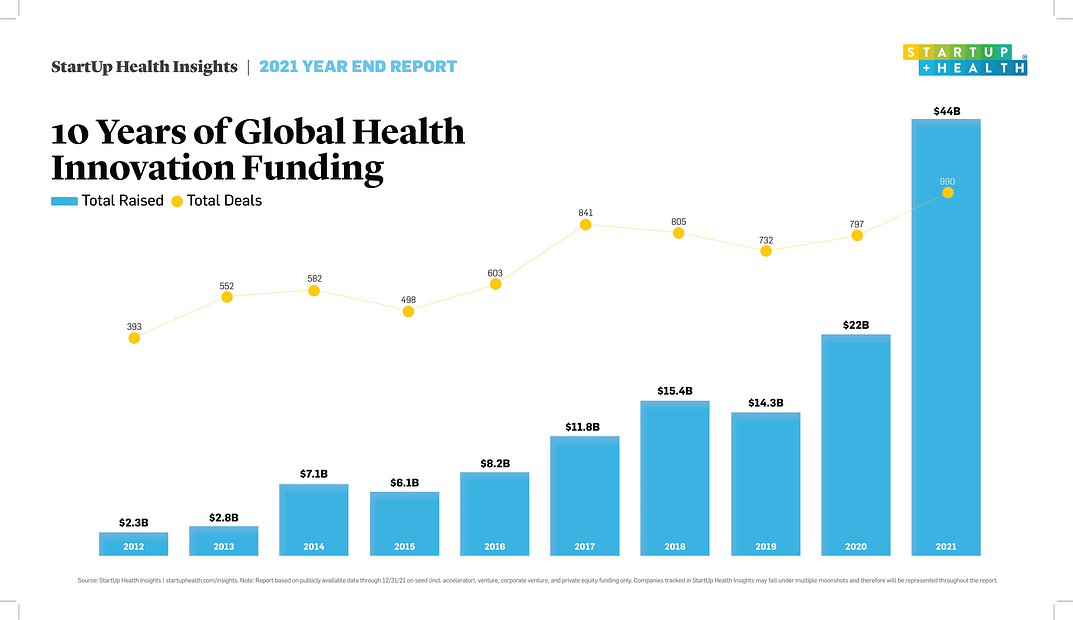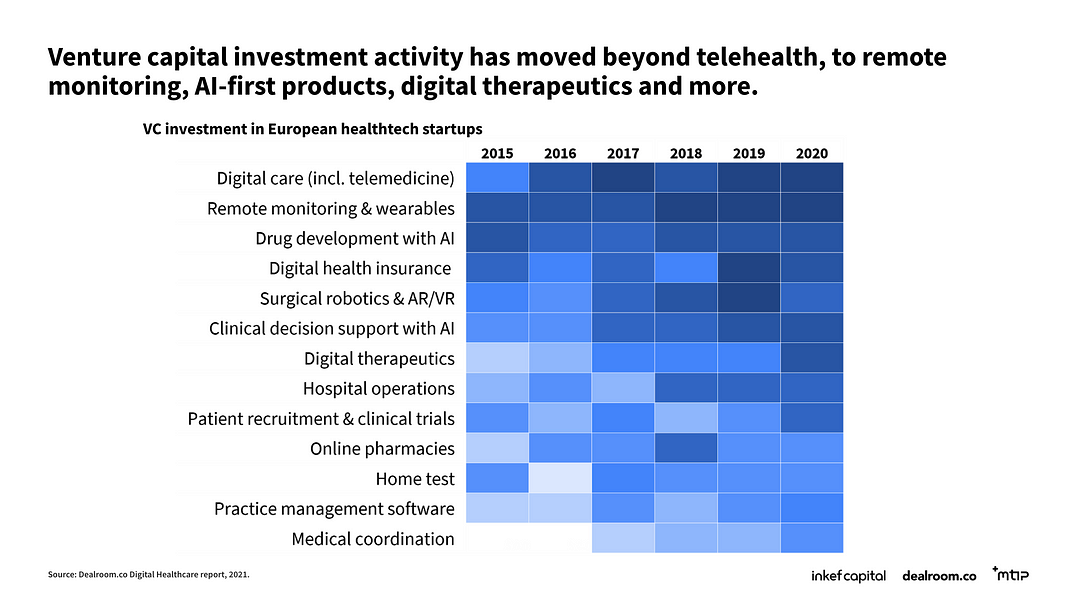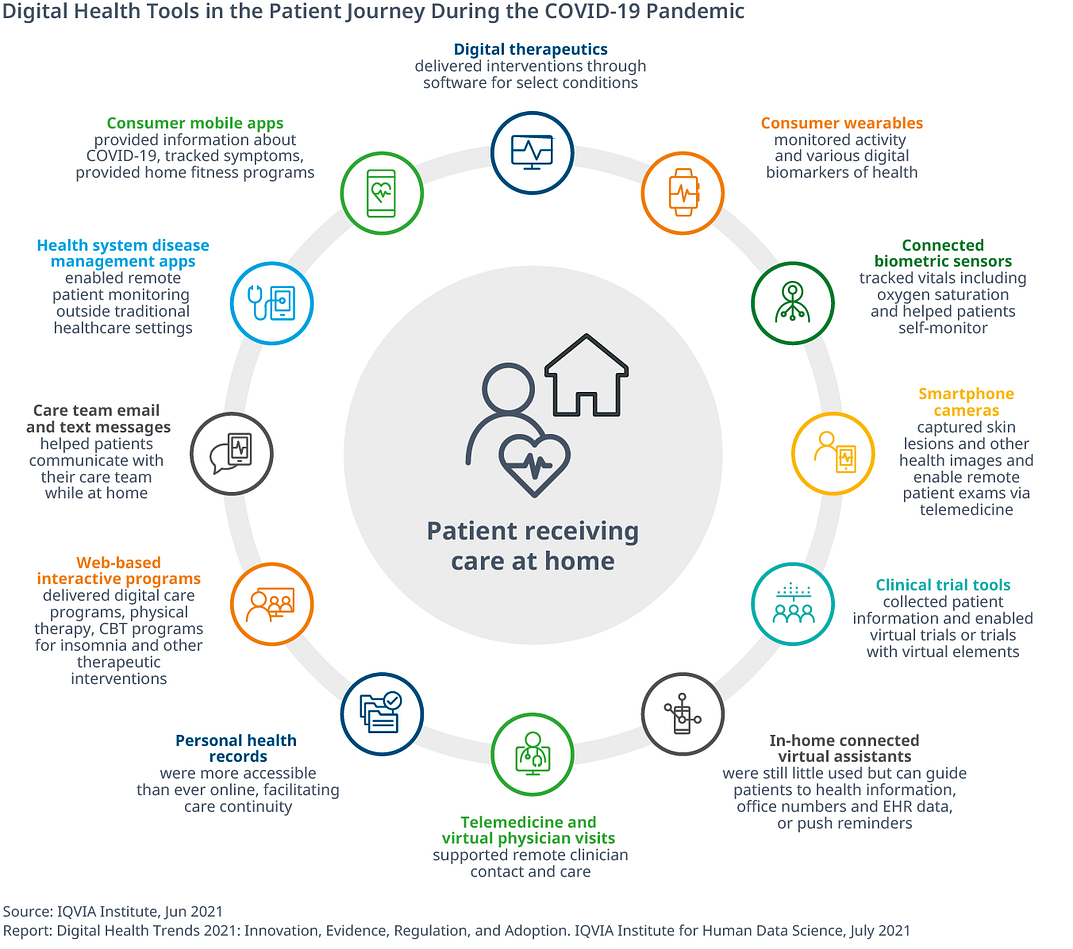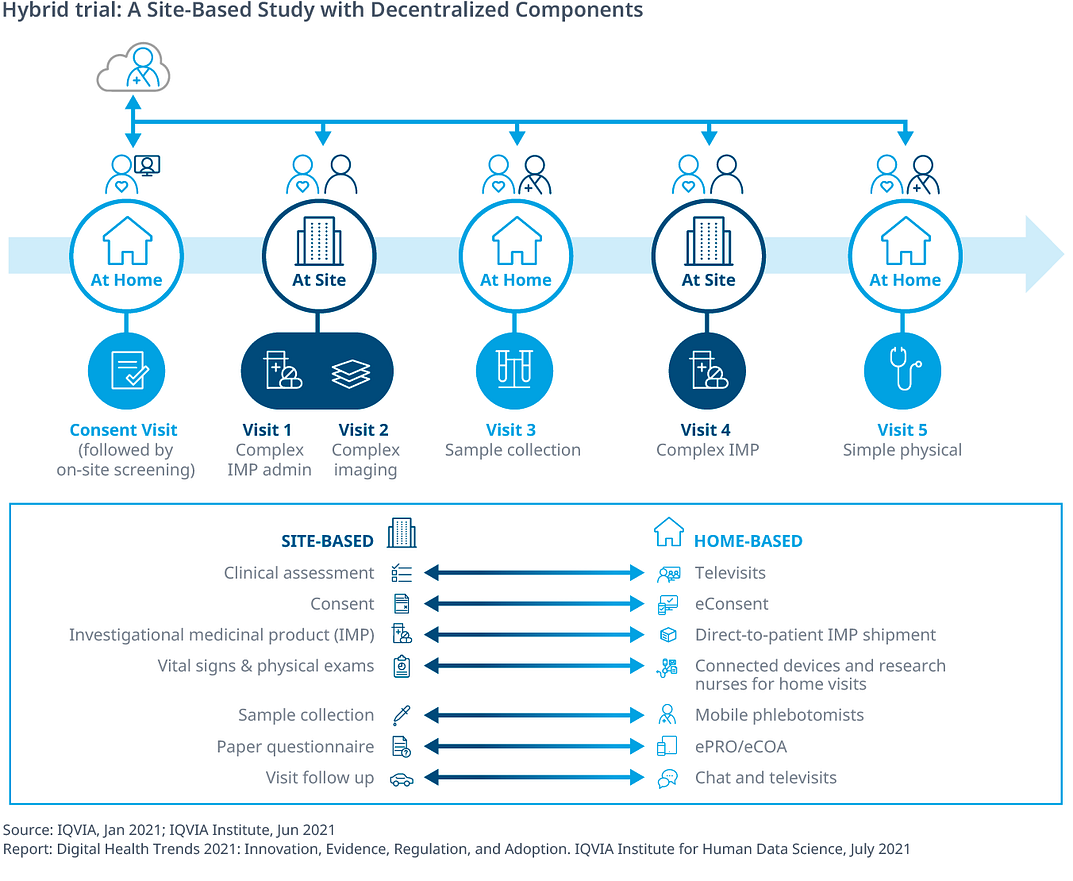Disruption in the healthcare industry in 2021 expected to continue in 2022, in relation to tech, data, AI and other tools.
World Economic Forum
Kelly McCain
17 Jan 2022
Image: Pixabay / @PixxlTeufel
Key messages
- The healthcare industry has seen a massive wave of investment, innovation and new entrants from the technology, telecom and consumer industries.
- There are also signs of disruption within the industry itself.
- Industry leaders reflect on these trends, and identify the biggest shifts we can expect to see in healthcare in 2022.
The pandemic is now two years old.
A population the size of Finland has so far died from COVID-19 and tens of millions more are dealing with its side-effects.
Even for those who haven’t fallen seriously ill, nearly every aspect of our lives has been disrupted by COVID-19: from how we socialize and communicate, to how we study and work.
We are all familiar with the crisis, but how has it impacted innovation, especially in the health and healthcare sector?
Most obviously, the industry has seen a massive wave of investment, innovation and new entrants from the technology, telecom and consumer industries.
In 2021 alone, $44 billion was raised globally in health innovation — twice as much as 2020 — and the acquisition of health and health tech companies rose 50%.

We’re also seeing signs of disruption within the industry itself.
Up to 80% of providers in the US are planning to invest in technologies including digital health, artificial intelligence (AI) and machine learning, as well as tools to support clinical staff and caregivers over the next five years.
Up to 80% of providers in the US are planning to invest in technologies including digital health, artificial intelligence (AI) and machine learning, as well as tools to support clinical staff and caregivers over the next five years.
During the week that the World Economic Forum was due to host its Annual Meeting in Davos — 17–21 January 2022 — the Forum is instead hosting a week of virtual events designed to focus global leaders on the issues set to dominate the year ahead.
The programme covers topics including vaccine equity and technological cooperation.
Ahead of the virtual meeting, we asked seven industry leaders to reflect on these trends, the biggest shifts we can expect to see in healthcare in 2022, and their outlook for the future.
‘We must think and act as one global society’
Belén Garijo, Chair of the Executive Board and CEO, Merck
The growing magnitude of this pandemic makes it more critical than ever that public and private stakeholders come together. We must think and act as one global society.
This pandemic cannot be the only focus of our attention.
Many other digital health trends will accelerate this year to make patient care more precise, personalized, and connected.
Internet of Things (IoT) and AI-enabled algorithms, machine-to-machine communications, and other technologies will continue to improve the productivity of patient diagnosis and treatment, as well as R&D.
Incremental advances across connected drug delivery, wearable devices, and apps will also improve levels of patient engagement and adherence.
Bioconvergence — where data and digital are rapidly merging with the latest techniques in drug discovery, engineering, and biotech — will help unlock the potential of personalized medicine.
Bioelectronics is another exciting field. It uses precise neurostimulation to better treat and monitor patients with chronic inflammatory diseases, as well as addressing other therapeutic areas with high unmet medical needs.
Collaborations between industry partners with interdisciplinary skills will become the new normal in 2022, while overall investment in pioneering research, as well as mergers and acquisitions, should continue to remain very strong.

‘Digitally-enabled care is at the heart of this transformation’
Frans van Houten, CEO, Royal Philips
With the pandemic raging on and health systems stretched, let’s rally to strengthen healthcare — for real.
The north star is a model in which care is more accessible, effective, sustainable and resilient. This will enable us to better serve patients in their communities and decrease the burden on healthcare providers.
Digitally-enabled care is at the heart of this transformation.
For example, AI supports clinical decision making, improves care orchestration and efficiency, and powers workflow automation.
Digital healthcare transformation presents opportunities for a greater shift to remote patient care through telehealth.
We can also drive behavioral health improvements in populations through coaching and gamification.
But we must not get caught up in endless planning. We have to get moving now, starting with clear, structural steps.
I firmly believe that we can achieve this transformation through deep partnerships with aligned objectives between governments, providers, payers and technology companies.
Together we can make change happen in a sustainable way and improve the lives of billions of people.

‘A shift towards new models of care’
Iskra Reic, Executive Vice President, Europe and Canada, AstraZeneca
2022 will be a transformative year for global health. The COVID-19 pandemic has brought long-existing weaknesses in our healthcare systems into sharp relief as they buckled under the pressure of the health crisis.
This calls for a shift towards new models of care that involve acting earlier to prevent, diagnose and treat diseases, and harnessing transformative innovations to improve patient outcomes.
This in turn will help us address the unsustainable burden of disease and ensure the resilience of our health systems against future shocks.
The pandemic has also created new opportunities: the adoption of digital health solutions took a quantum leap, for example.
Patients and healthcare professionals are experiencing how remote care can be more timely for patients, reduce hospitalisation and increase healthcare workforce effectiveness.
A more sustainable future for health relies on new models of public-private partnership, leveraging the unprecedented collaboration we have seen during the pandemic.
It requires us to think differently about health investment, moving away from a short-term savings mindset to ensuring longer-term benefits to healthcare systems and economies.
The Partnership for Health System Sustainability and Resilience is one example driving this change in over 20 countries globally.
It provides practical solutions and transferable insights to redesign more sustainable and resilient health systems, where economies and populations flourish.
‘Technology is the great equalizer’
Geoff Martha, Chairman and CEO, Medtronic
The pandemic put a magnifying glass on another global crisis: health inequity.
Systemic socioeconomic, racial, geographic and even generational factors all contribute to reaching — and maintaining — good health.
We must step-up to close the gaps, particularly with the rise in chronic disease posing a significant public health threat. Barriers to education, diagnosis and treatment must be urgently addressed.
Technology is the great equalizer. While the pandemic amplified disparities, it also ushered in a surge of digital transformation. To begin balancing the scales on health inequity, we must make technology work harder. We have to look at the full spectrum, from developing technologies that reach more patients in new ways (e.g. at-home exams and remote screenings) to enabling community healthcare workers to do more (e.g. expanding access to expertise via virtual trainings). And then, we must push further to develop an equitable health technology culture.
Creating lasting solutions requires an intentional focus on evolving equity-informed technology. AI, advanced computing and hyper-personalization will transform healthcare in ways we are still imagining. As reinforced by the World Economic Forum’s Global Future Council, we must proceed with urgency — not haste — to ensure these advancements help dismantle inequities rather than exaggerate existing issues.
‘It’s not enough for AI to be smart, it also needs to be wise’
Masayasu Okajima, Research Officer, SOMPO Research Institute
AI is beginning to transform healthcare. It can now diagnose some medical conditions more accurately than humans.
Global health data volumes are expanding by around 36% annually and this ever-growing pool of available data means we can expect both rising precision and a wider range of uses in the future.
But it’s not enough for AI to be “smart”-that is, precise and reliable — it also needs to be “wise, meaning well-governed and applied in optimal value-creating ways.
AI might be able to identify cancerous tumors, for example, but it is humans who need to decide which kinds of cancer should be targeted, and at what stage.
Wise AI use creates both new responsibilities and new opportunities for doctors, policy-makers and healthcare companies.
A number of pioneering medical AI companies in Japan are focusing, not only on algorithms, but on the entire AI workflow — from creating and preparing input data, to training employees to use the output, to modifying user interfaces for AI products.
‘Championing digitalization in trials’
Paul Hudson, CEO, Sanofi
The pandemic presented challenges that pushed us to change the way the entire healthcare industry works. By embracing collaboration and digitalization, we found ways to continue advancing science and innovation while making healthcare more inclusive.
For example, we furthered our efforts to modernize clinical trials by incorporating technology that allowed us to conduct and remotely monitor more patient-centric clinical trials in cooperation with regulators.
By the end of 2020, 76% of clinical trials conducted most or all site visit monitoring remotely, compared to 18% in 2019.

This comes on top of the deployment in most of our trials of at-home patient assessment, including everything from using electronic consent and telemedicine, to having patients wear monitoring devices.
And we are far from being done innovating. In-silico approach based on AI and virtual patient populations could usher in a new era of innovation in how clinical trials are conducted.
The entire healthcare ecosystem — from the industry to the regulators — needs to keep championing digitalization in trials in 2022. There are clear opportunities to increase access to clinical trials, better capture the diversity of human populations in research and potentially accelerate the development of new breakthrough therapeutic solutions for patients.
‘A global economy should focus on progress, people, and planet’
Greg Reh, Global Life Sciences & Health Care Leader, Deloitte
Environmental, social and governance (ESG) issues are being discussed in executive suites.
In addition to carbon footprints, some companies are now measuring their “health footprint”. There is a growing recognition that health equity — the opportunity for everyone to achieve their full health and wellbeing — should be a core part of ESG. Developing ESG frameworks and measurements is becoming critical.
Three groups are paying close attention to the intersection of health equity and ESG:
● Investors: Some now include ESG in their due diligence. Companies that demonstrate commitment and progress in health equity could be rewarded.
● Regulators: 50 years ago, some companies dumped waste into waterways. Regulations now prevent that. Regulators could take a similar approach if companies hinder health equity.
● Consumers: Rather than making purchase decisions based solely on price, some consumers are evaluating a company’s purpose. Ignoring ESG could have a negative impact on brand and business. Employees, activists, and NGOs are also pushing for action.
A global economy should focus on progress, people, and planet.
Ending health disparities will likely require collaboration among consumers, companies, communities, and governments.
Find out more about World Economic Forum partners here.
Originally published at https://www.weforum.org.
Names cited
Belén Garijo, Chair of the Executive Board and CEO, Merck
Frans van Houten, CEO, Royal Philips
Geoff Martha, Chairman and CEO, Medtronic
Masayasu Okajima, Research Officer, SOMPO Research Institute
Greg Reh, Global Life Sciences & Health Care Leader, Deloitte
Iskra Reic, Executive Vice President, Europe and Canada, AstraZeneca
Paul Hudson, CEO, Sanofi












